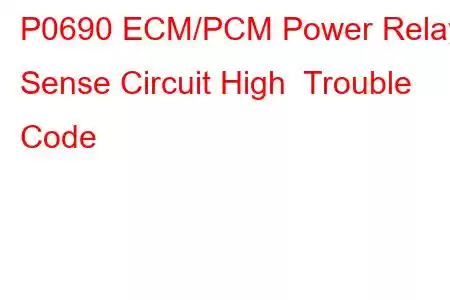P0690 ECM/PCM Power Relay Sense Circuit High
OBD-II Trouble Code Technical Description
ECM/PCM Power Relay Sense Circuit High
What does that mean?
This is a generic diagnostic trouble code (DTC) and applies to many OBD-II vehicles (1996-newer). That may include but is not limited to vehicles from Chevrolet, Ford, VW, Jeep, Audi, Chrysler, Dodge, Cadillac, etc. Although generic, the exact repair steps may vary depending on year, make, model, and powertrain configuration.
When a code P0690 is stored, it means that the powertrain control module (PCM), has detected an abnormality in the relay which supplies it with voltage. This particular code will be stored if power relay sensor circuit voltage exceeds the maximum allowable parameter.
The PCM power relay is used to apply battery voltage safely to the appropriate PCM circuits. It is a contact type relay that is activated with a signal wire from the ignition switch. This type of relay typically uses a five-wire design. Constant battery voltage is applied on one wire; ground on another. A third circuit carries a signal from the ignition switch and a fourth supplies voltage to the PCM. The fifth wire is the power relay sense circuit. It is used by the PCM to monitor power relay voltage.
If the PCM detects a high voltage condition on the power relay sense circuit, a code P0690 will be stored and a malfunction indicator lamp (MIL) may be illuminated.
A typical PCM powertrain control module, opened up:
What is the severity of this DTC?
A P0690 should be categorized as severe and addressed accordingly. It may result in a a no start condition and/or a variety of drivability issues.
What are some of the symptoms of the code?
Symptoms of a P0690 trouble code may include:
Delayed or no start Electrical accessories may be inoperative Engine drivability issuesWhat are some of the common causes of the code?
Causes for this code may include:
Defective PCM power relay Blown fuse or fusible link Open or shorted circuit between the power relay and the PCMWhat are some P0690 troubleshooting steps?
A diagnostic scanner and a digital volt/ohmmeter (DVOM) will be required to diagnose a code P0690.
A source of reliable vehicle information will also be necessary. From it you will glean diagnostic flow charts, wiring diagrams, connector face views, connector pin-out charts, and component locators. You will also find component and circuit testing procedures and specifications. All this information will be needed to successfully diagnose a code P0690.
Connect the scanner to the vehicle diagnostic port and retrieve all stored codes and freeze frame data. Make a note of this information as it may prove useful if the code proves to be an intermittent one.
After recording all pertinent information, clear the codes and test drive the vehicle (if possible) until the code is reset or the PCM enters readiness mode.
If the PCM enters readiness mode, the code is intermittent and will be even more difficult to diagnose. The condition, which caused the P0690 to be stored, may need to worsen before an accurate diagnosis can be reached. On the other hand, if the code fails to reset and there are no drivability symptoms exhibited, the vehicle can be operated normally.
Consult your vehicle information source for technical service bulletins (TSB) that replicate the code stored, vehicle (year, make, model, and engine), and symptoms exhibited. If you find the appropriate TSB, it may yield helpful diagnostic information.
If the P0690 code is immediately reset, proceed with a visual inspection of system related wiring and connectors. Harnesses that have been broken of unplugged should be repaired or replaced as required.
If wiring and connectors appear functional, use your source of vehicle information to obtain the appropriat
Read: 37


